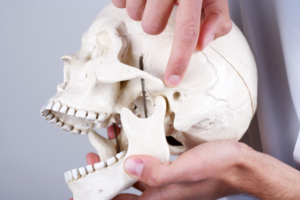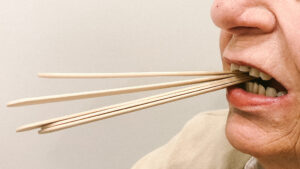At North 49 we recently saw a patient referred to the clinic with the diagnosis of trismus. Unfortunately, she had been living with it since having a tooth removed over a year prior. To make matters worse, the trismus prevented her specialist from examining the inside of her mouth as she also had oral cancer. So, what is trismus? Let’s review!
Trismus How to Pronounce?
tri·smuhs
What Does Trismus Mean?
Simply, it is a temporomandibular disorder where there is a reduced ability to open your mouth (limited jaw range of motion). It’s also known as lockjaw. If you have trismus it will interfere with your ability to eat, speak, and maintain proper oral hygiene (i.e. brushing your teeth). Examination and treatments requiring access to the inside of your mouth can be limited, or in some cases impossible.
Who Can Diagnose Trismus?
Any healthcare provider can diagnose trismus, but it is typically seen by dentists, physiotherapists, family physicians, medical specialists (i.e. otolaryngology), and speech language pathologists.
What Causes Trismus?
It can be due to a condition affecting your temporomandibular joint (jaw joint that is just in front of your ear) or the tissue around the jaw itself. Conditions affecting the joint can include:
- The displacement of the disc in the joint.
- A joint fracture.
- Swelling due to trauma.
- Septic arthritis.

- Osteoarthritis …
Causes not from the joint can include:
- Jaw fracture not involving the joint.
- Swelling due to oral surgery (i.e. removal of impacted wisdom teeth or other dentoalveolar surgery).
- Recent prolonged dental treatment (i.e. root canal).
- Acute infection affecting the oral tissues.
- Infections such as Tetanus.
- Oral/jaw cancer.
- Radiation fibrosis …
Which Muscle Causes Trismus?
If there is muscle involvement it will be due to the masseter, temporalis, and/or the medial pterygoid as these are the three main muscles that close the mouth.
Will Trismus Go Away?
Depending on the cause, sometimes it will go away on its own and other times it will require treatment. In some cases, even with treatment there will be a permanent level of limited opening. The key to maximize recovery is getting treatment right away.
Lockjaw vs Trismus
If you are wondering what is the difference between trismus and lockjaw, they are actually the same thing.
How to Treat Trismus (Lockjaw)?
If your trismus is due to an infection or swelling the initial treatment will likely consist of medication prescribed by your dentist, physician, or specialist. The application of ice and moving the jaw in a pain free range may also be recommended.
If it is due to a disc displacement the initial treatment approach would be physiotherapy and if that does not work you may be referred to a surgeon.
If the trismus was due to past trauma or occurred after a dental procedure you should be followed up with a physiotherapist who has specialized training in treating temporomandibular disorders.  The physiotherapist will show you specific exercises to stretch your jaw and mobilize the tissues around the jaw. If needed, they may also manually stretch and provide mobilization treatment. When the jaw is extremely stiff they may have you purchase a hand held appliance to stretch the jaw. Alternatively, they may simply have you stack tongue depressors between your teeth to slowly pry the mouth open as we did with the patient we mentioned at the start of this blog.
The physiotherapist will show you specific exercises to stretch your jaw and mobilize the tissues around the jaw. If needed, they may also manually stretch and provide mobilization treatment. When the jaw is extremely stiff they may have you purchase a hand held appliance to stretch the jaw. Alternatively, they may simply have you stack tongue depressors between your teeth to slowly pry the mouth open as we did with the patient we mentioned at the start of this blog.
The goal of treatment is to get you to open your mouth so there is 35-45mm between the top and bottom teeth. This will allow you to enjoy that big spoon of ice cream or take a bite into that crisp, juicy apple.
We can treat Trismus!
If you have any further questions, please feel free to contact North 49 Physiotherapy at 306-343-7776.
Alternatively, if you want to book an assessment to have your jaw assessed feel free to call the clinic or book 24/7 online at www.north49therapy.com.

